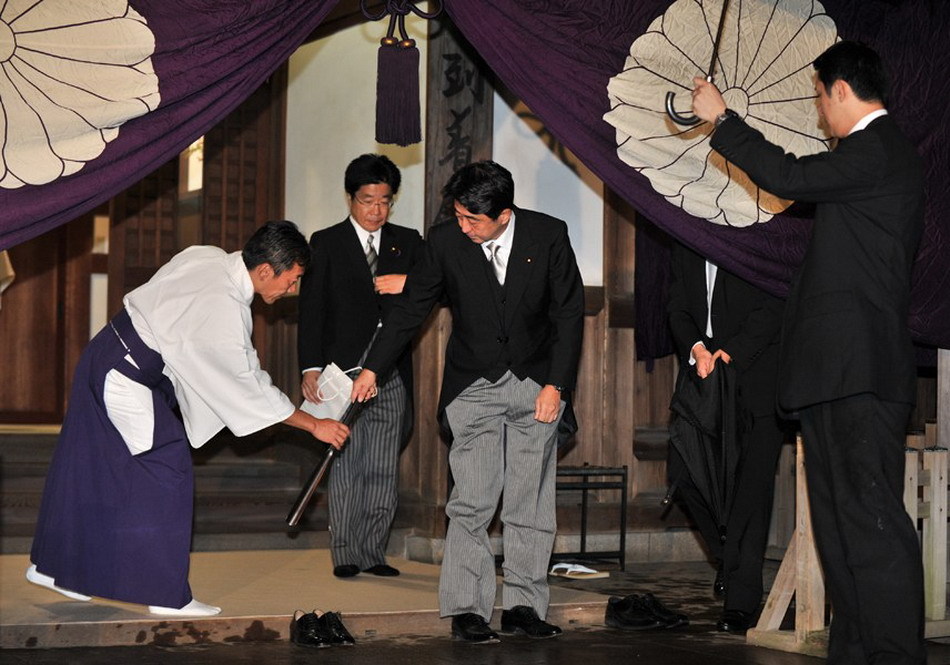Ex-Japanese PM's visit to shrine 'will fuel row'
 0 Comment(s)
0 Comment(s) Print
Print E-mail China Daily, October 18, 2012
E-mail China Daily, October 18, 2012
 |
|
The leader of Japan's main opposition party Shinzo Abe visits the controversial Yasukuni Shrine on Wednesday.[Photo/Chinanews.com] |
The leader of Japan's main opposition party visited the controversial Yasukuni Shrine on Wednesday in a move that will raise tensions already heightened by the Diaoyu Islands.
The visit by Shinzo Abe, president of the Liberal Democratic Party who is expected by some to become Japan's next prime minister, came as the country is increasingly at odds with its Asian neighbors over territorial issues. The move reflected the resurgence of nationalism in Japan that could endanger regional stability, analysts said.
Abe, a former prime minister, visited the shrine in Tokyo which honors the nation's war dead, including Class-A war criminals.
As a symbol of Japan's aggression in, and before, World War II, visits of politicians to the shrine have infuriated Japan's neighbors, including China and South Korea.
Junichiro Koizumi, another former Japanese prime minister, officially visited the shine five times during his term between 2001 and 2006, sparking anti-Japan protests in China and South Korea and a diplomatic crisis.
Before his election to the party leadership in September, Abe said he regretted not visiting the shrine when he was prime minister (2006-07) for fear of reaction in neighboring countries.
Jonathan Hoslag, research fellow at the Brussels Institute of Contemporary China Studies, said Abe is part of a nationalist revival.
"As the mainstream parties have lost their credibility and Japanese society is becoming more and more uncertain about its position in the new global order, hardliners and nationalists have gained ground. Abe is one of them," Hoslag said.
Abe also called for a rethink of a 1993 apology by Japan to "comfort women" who were forced to work as sex slaves by the Japanese military in the 1930s and 1940s.
Richard Caplan, professor of international relations at the University of Oxford, said compared with German politicians who took a number of steps to improve relations with European states in the wake of World War II, Japan's postwar leadership "has not exhibited comparable courage and sincerity".
The Japan Daily Press said the visit by Abe "will literally be throwing nationalistic fuel on the fire in the tense relations with China''.
Earlier this week, Abe also told William Burns, the US deputy secretary of state, that "there was no room for talk" on the Diaoyu Islands. The islands have belonged to China for centuries.
Burns arrived in Beijing on Tuesday for talks.
Wang Ping, a researcher on Japanese studies at Chinese Academy of Social Sciences, warned that Japanese politicians are increasingly growing radical to prove their rightwing credibility ahead of a general election expected shortly.
"As Japanese politics becomes even more conservative, uncertainties may continue to mount and trigger further concern among Asian neighbors worried about regional stability," Wang said.
Gemba's European visit
While Abe was pandering to nationalist sentiment, Japanese Foreign Minister Koichiro Gemba got a cold shoulder in the first stop on his visit to France, Britain and Germany.
Prior to his departure for Europe, Gemba said his trip would be, in part, to seek international recognition for Japan's so-called claim over the Diaoyu Islands.
On Tuesday, French Foreign Minister Laurent Fabius held talks with Gemba in Paris. They exchanged views on relations and deepening cooperation in economic development and cultural exchanges, according to a brief statement issued by the French Foreign Ministry after the meeting.
The visit by the Japanese foreign minister received little attention in the French media. Economic issues were reportedly the focus of discussion while the islands went not mentioned in the statement issued by the French Foreign Ministry.
Burns' Beijing tour
US Deputy Secretary of State Burns met Foreign Minister Yang Jiechi and held talks with Vice-Minister of Foreign Affairs Zhang Zhijun on Wednesday.
Burns was rumored to be playing a mediating or messenger role during his eight-day trip to five Asian countries. Yet a press release by the Foreign Ministry made no mention of this.
Beijing stressed that keeping ties stable and developing them "serves the core interests of both countries", and both should "appropriately handle sensitive issues and ensure the consistent development of China-US ties".
Tao Wenzhao, a specialist on US studies with the Chinese Academy of Social Sciences, said the role of the US envoy had been overblown.
"Beijing has clarified that the islands are within its core interests, and both countries realize that the top priority right now is to ensure the stability of ties," Tao said.
Washington has previously affirmed that it does not have a position on the row, and it rejected any mediation role.





